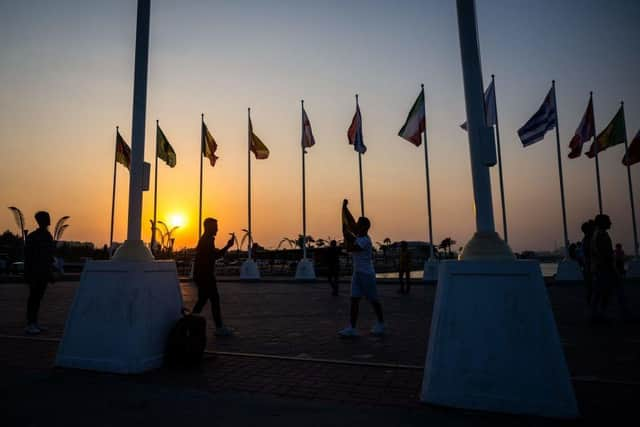Fifa World Cup 2022: LGBT people arrested and detained in Qatar just weeks before World Cup, human rights group claims
Human Rights Watch documented six cases of severe and repeated beatings and five cases of sexual harassment in police custody between 2019 and 2022 – the most recent taking place in September. Security forces arrested people in public places based solely on their gender expression and unlawfully searched their phones. As a requirement for their release, security forces mandated that transgender women detainees attend conversion therapy sessions at a government-sponsored “behavioural healthcare” centre.
The country’s treatment of LGBT people has come under intense international scrutiny as it prepares to host the football tournament. In 2020, Qatar assured prospective visitors that it would welcome LGBT visitors and that fans would be free to fly the rainbow flag at World Cup matches.
Advertisement
Hide AdAdvertisement
Hide Ad“While Qatar prepares to host the World Cup, security forces are detaining and abusing LGBT people simply for who they are, apparently confident that the security force abuses will go unreported and unchecked,” said Rasha Younes, LGBT rights researcher at Human Rights Watch. “Qatari authorities need to end impunity for violence against LGBT people. The world is watching.”


Human Rights Watch interviewed six LGBT Qataris, including four transgender women, one bisexual woman, and one gay man.
All said Preventive Security Department officers detained them in an underground prison in Al Dafneh, Doha, where they verbally harassed and subjected detainees to physical abuse, ranging from slapping to kicking and punching. One woman said she lost consciousness. Security officers also inflicted verbal abuse, extracted forced confessions, and denied detainees access to legal counsel, family and medical care. All six said police forced them to sign pledges indicating they would “cease immoral activity.”
All were detained without charge, in one case for two months in solitary confinement, without access to legal counsel. None received any record of having been detained.
All of those interviewed said Preventive Security forces forced them to unlock their phones and took screenshots of private pictures and chats from their devices, as well as contact information of other LGBT people.
One transgender Qatari woman said after security forces arrested her on the street in Doha, Preventive Security officers accused her of “imitating women” because of her gender expression. In the police car, they beat her until her lips and nose were bleeding and kicked her in the stomach, she said.
She said part of her release requirement was attending sessions with a psychologist who “would make [her] a man again”.
Qatar’s Penal Code punishes extramarital sex, including same-sex relations, with up to seven years in prison. None of those interviewed said they faced charges.
Advertisement
Hide AdAdvertisement
Hide AdHuman Rights Watch said it appeared their arbitrary arrest and detention was based on law No.17 of 2002 on protection of community, which allows for provisional detention without charge or trial for up to six months, if “there exist well-founded reasons to believe that the defendant may have committed a crime”, including “violating public morality”.
Comments
Want to join the conversation? Please or to comment on this article.
